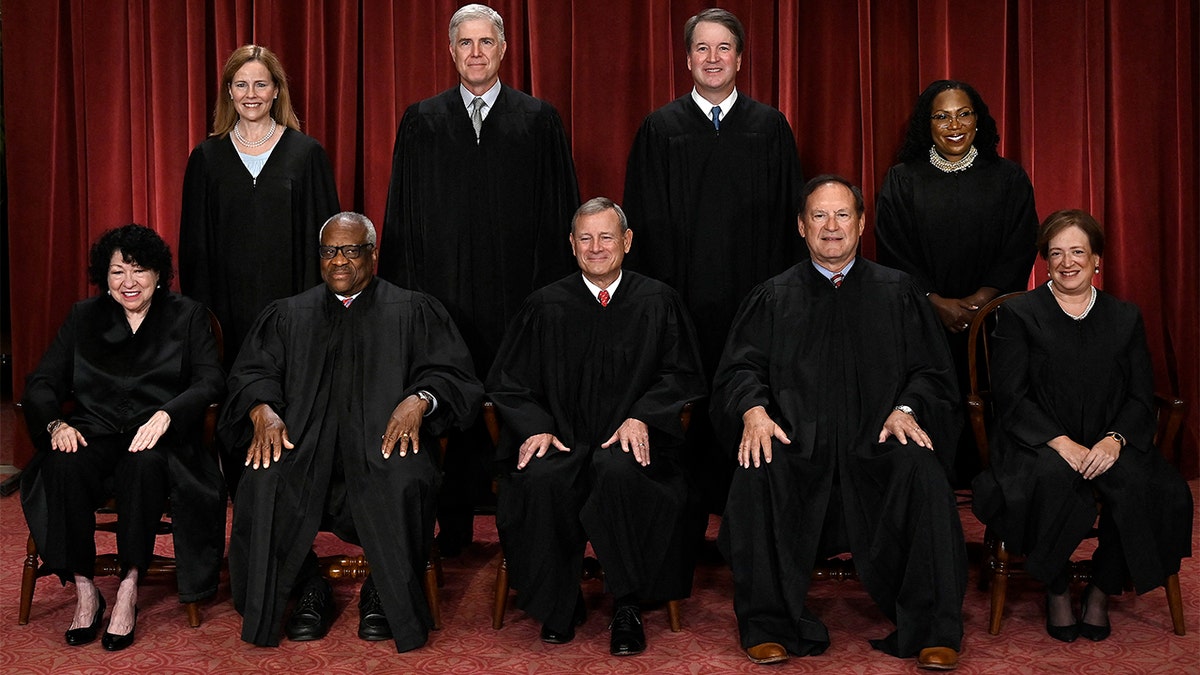
President Biden’s three-part proposal to transform the Supreme Court, which includes a constitutional amendment, is likely doomed from the start as it would need significant support in the nearly evenly divided Congress and across state legislatures.
On Monday morning, Biden revealed a plan to overhaul the Supreme Court amid several recent rulings handed down by the majority conservative bench that were unfavorable to Democrats.
His outline included term limits for Supreme Court justices, who currently serve lifetime appointments, as well as an enforceable ethics code and a constitutional amendment that would overturn the latest ruling that former presidents have substantial immunity from prosecution for official acts while in office.

Biden released a plan for changing the Supreme Court. (Evan Vucci, Pool via AP)
Biden specifically requested a “No One Is Above the Law Amendment,” which he said should lay out that the Constitution doesn’t provide immunity to former presidents from federal indictments, trials, convictions, or sentencing because of their status as a previous president.
In order to amend the Constitution, two-thirds of both chambers of Congress have to propose it. Then, the amendment would need to be ratified by three-fourths of state legislatures or state conventions. An amendment could additionally be proposed by the request of two-thirds of states at a convention called regarding the subject.
GOP LOOKS TO REVOKE VISAS FROM PARTICIPANTS IN VIOLENT PROTESTS AHEAD OF NETANYAHU ADDRESS

The Supreme Court has been the subject of frequent protests. (AP Photo/Steve Helber)
There are only 27 total amendments to the Constitution, the last of which was approved more than three decades ago, in 1992.
With a razor-thin divide between Democrats and Republicans in both the House of Representatives and Senate, as well as commonly divided state governments and only a few Democratic trifectas, the prospect of passing any amendment, particularly one favored by just one party, is doubtful at best.
Biden also proposed that term limits be approved for Supreme Court justices. In 1951, the 22nd amendment was ratified, which enforced a two-term limit on American presidents. The new amendment came shortly after the presidency of the late Franklin D. Roosevelt, who had been elected to four consecutive terms.
BOB MENENDEZ TO RESIGN FROM SENATE AMID DEMOCRATIC PRESSURE AFTER GUILTY VERDICT

Supreme Court Justices posing for an official photo at the Supreme Court. (Photo by OLIVIER DOULIERY/AFP via Getty Images)
It would be similarly improbable to successfully ratify an amendment imposing term limits on justices.
Further, if congressional Democrats were to attempt to pass the term limits as a law, if they hypothetically had the votes to do so, it would almost certainly be challenged in court. Since the term limits aren’t laid out in the Constitution, the law would be vulnerable to being struck down.
JEFFRIES, SCHUMER ENDORSE KAMALA HARRIS FOR PRESIDENT

A side-by-side image of U.S. President Joe Biden and Senate Majority Leader Chuck Schumer, D-N.Y. (Getty Images)
The president additionally called for Congress to pass a law for an enforceable ethics code to be applied to the Supreme Court. The code should require the disclosure of gifts, that the justices refrain from any public political activity, and that they recuse themselves from cases in which they or their spouses have potential conflicts of interest.
CLICK HERE TO GET THE FOX NEWS APP
Such a law would require passage by Congress and likely a 60-vote approval to overcome the filibuster in the Senate. Given that Majority Leader Chuck Schumer, D-N.Y., has opted against bringing a Democratic bill to enforce an ethics code on the court to the floor, it’s unlikely that the threshold would be met in the divided Congress.
Schumer’s office did not provide comment to Fox News Digital in time for publication.








